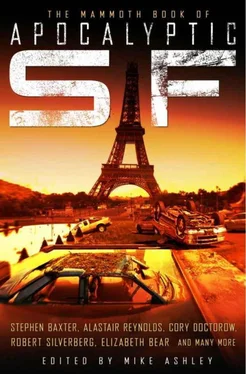“You live that far out of town?”
“We don’t all live on Geneva salaries, you know.” Ngoyi’s face blanched suddenly as he stared into the evening traffic. “Stop the car! Handbrake turn! Handbrake turn!”
Mativi stared into the traffic. “Why?”
“Four secret police cars, dead ahead!”
It was true, and Mativi cursed himself for not having seen it. The SUVs stood out like aluminium islands in the sea of polyurea AfriCars. Each one of them would have cost ten times an ordinary Kinshasan’s annual salary.
“It’s not a roadblock,” said Mativi.
“So I should care? They’re out looking for you!”
“…looks like an escort. They’re not even coming down this road. They’re turning on to the freeway to Djelo-
Binza. They’re escorting that big, heavy launch tractor… one of the ones designed to carry clutches of heavy ballistic missiles out to the pads at Malebo.” He peered out of the driver-side window. “The one whose suspension is scraping the ground —”
He did a handbrake turn and left the road in the direction of Djelo-Binza. The suspension hardly noticed the difference. The only reason people drove on roads any more in Kinshasa was because the road was slightly more likely to have been checked for explosives.
There was only desultory hooting when he rejoined the road. Leaving the road and rejoining it after a four-wheel-drive shortcut was common. The four-by-fours were clearly visible now, crammed with whatever men the police chiefs had been able to get their hands on at short notice — some in military uniform, some in T-shirts, some with government-issue sidearms, some with war-era AKM’s, yawning, pulled out of bed in the early hours.
The crawler was taking up three lanes of traffic, drawing a horde of honking AfriCars behind it like a bridal train. Despite the horns, the crawler was probably not moving much slower than the cars would have done — the expressway was still a mass of blast craters.
“I can’t believe this,” said Mativi, hugely affronted. “How can they think they can haul a million-tonne object across town without me noticing?”
Ngoyi stared. “You think that thing’s got — things on it?”
Mativi nodded. “One of the things is on board — one of the containers. They’re taking it across town because they can’t bear to lose it… I wonder why.” He winked at Ngoyi. “Maybe they’re in the pay of the office of sanitation?” The car plunged into yet another black void unilluminated by its headlights. “JESUS, I wish those streetlights were working.” He blinked as the car bonnet surged up again into the light.
Then he realized. Not only were there no streetlights, there were also no lights in the city around the road.
“That’s it, isn’t it?”
“What?”
“They’re going to the power company. You dumb fucks have been plugging power into it as well. Haven’t you?”
Ngoyi hesitated, then gave up the game and nodded. “It started out as a theoretical weapons project in the last days of the war. But,” he insisted defiantly, “it was a peaceful use we put it to! One of our office juniors, a very clever young man, a PhD from CalTech, suggested that if we aimed an infra-red laser beam at the event horizon at a certain angle, it would come out as a gamma-ray beam, which we used to heat a tank of mercury… we tried water first, but it flash evaporated and fused the rock around the tank to glass.” He licked his lips nervously. “The hardest part was designing a turbine system that would work with evaporating mercury. We lost a lot of men to heavy metal poisoning…”
Realization dawned on Mativi. “You were one of the researchers in Lissouba’s government.”
“You think I could have got away with living in the old People’s Democratic Republic with a physics degree without being a weapons researcher?”
Ngoyi laughed hollowly. “Dream on, brother. But this is peacetime now. The technology is being used to power the houses of five million people —”
“Uh-uh. There’s no sidestepping the Laws of Thermodynamics. You only get out less than what you put in. You’re only getting power out because you’re sapping the angular momentum of what’s inside the container. I’ll lay a bet that what’s inside the container was created illegally using the Lubumba Collider that President Lissouba convinced the UN to build to ‘rejuvenate the Congolese economy’ —”
Ngoyi squirmed. “He also said scientify the Congolese economy. He actually used the word ‘scientify’.”
Mativi nodded. “In any case, that angular momentum was put into the container by gigawatts of energy pumped into the Collider from the city power grid. Effectively all you’re doing is using up energy someone stole and stored fifteen years ago. It’s no more a power source than a clockwork doll is, Jean-Baptiste. You have to wind it up to watch it go. And all you’ll be left with, in the end, is a non-rotating very heavy lump of extremely bad shit.”
“Well, I must admit,” admitted Ngoyi ruefully, “the amount of juice we can squeeze out of it is getting smaller every year.”
The tractor in front suddenly rumbled to a halt in a cloud of dust big enough to conceal a herd of rhinos. A wall of immobile metal barred the carriageway, and three lanes of drivers performed the peculiarly Congolese manoeuvre of stepping on their brakes and leaning on their horns simultaneously. One of them shrieked suddenly in dismay when a length of caterpillar track resembling a chain of house facades clipped together with traffic bollards slammed down on to his bonnet and crushed it flat, before slapping his saloon into a cabriolet. Paint flakes flew everywhere. The car was a steel one, too — an old Proton model produced under licence in Afghanistan. Mativi hoped the driver had survived.
Troopers poured out of the four-by-fours, ignoring the barrage of horns. They were staring at the side of the tractor. Some good Catholics were even crossing themselves.
Mativi put the handbrake on and left his car. Someone hooted at him. He ignored them.
One whole side of the tractor had collapsed into the asphalt. The torsion bars of the vehicle’s suspension, each one a man’s waist thick and made of substances far, far stronger than steel, had snapped like seaside rock. The load on top of the tractor had slumped sideways underneath its canvas blanket.
Now that he was outside the car, he was aware of a hissing sound. The sound was coming from a hole punched in the canvas cover.
Some of the troopers were walking up towards the load. Mativi danced out on to the grass verge, waving his arms like an isangoma.
“No! Non! Get away! Tres dan-gereux!”
One of the men looked at Mativi as if he were an idiot and took another step fonvard. His sleeve began to rustle and flap in the direction of the hole in the canvas. Then his hand slapped down on to the canvas cover, and he began to scream, beating on his hand, trying to free it. His comrades began to laugh, looking back towards Mativi, enjoying the joke their friend was having at the crazy man’s expense.
Then he vanished.
Not quite vanished — Mativi and the troops both heard the bones in his hand snap, saw the hand crumple into the canvas like a handkerchief into a magician’s glove, followed by his arm, followed by his shoulder, followed by his head. They saw the flare of crimson his body turned into as skin, bone, blood vessels, all the frail materials meant to hold a body together, degenerated into carmine mulch and were sucked up by the structure. A crimson blot of blood a man wide sprayed on to the canvas — out of which, weirdly, runnels of blood began trailing inward towards the hole, against and at angles to gravity.
Читать дальше












